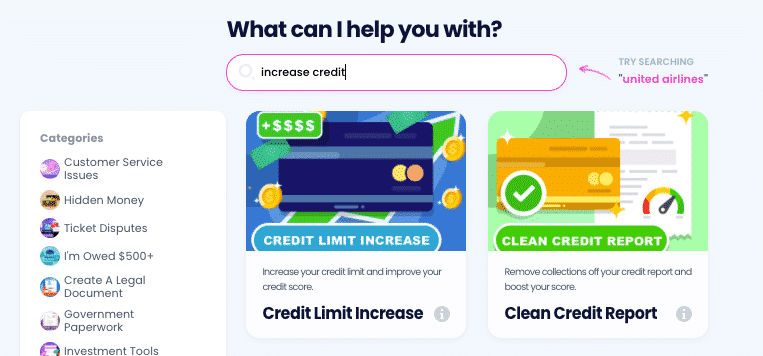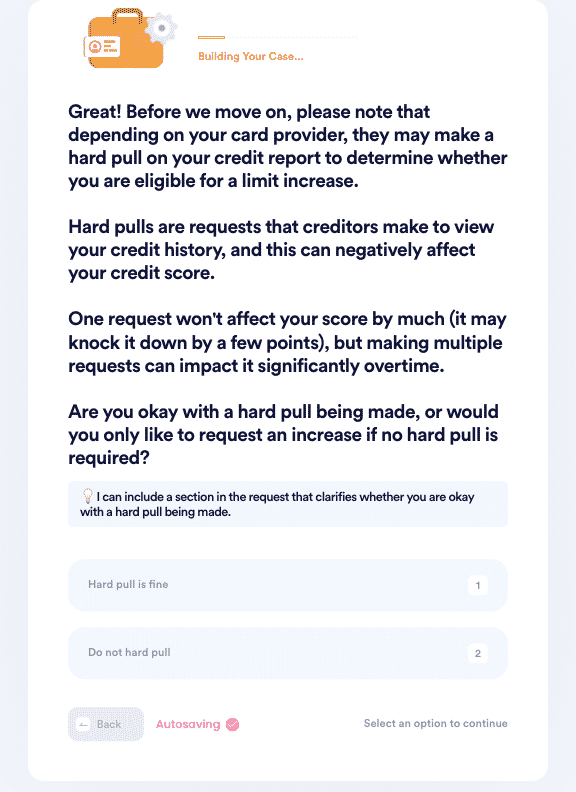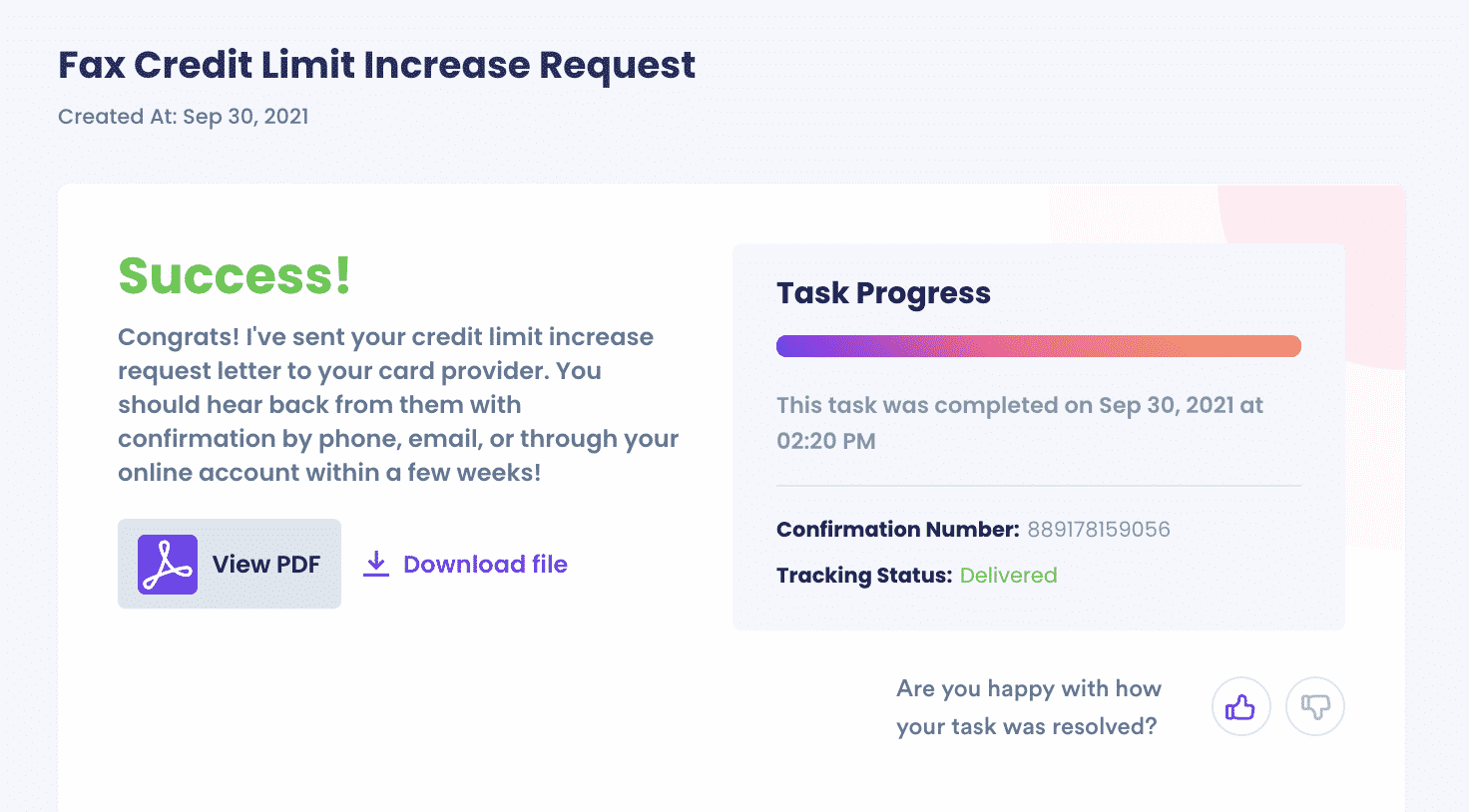Easily Increase Your First Progress Credit Limit with This Hack
A credit limit controls how much money you can spend on your credit card. In a way, the limit is a protective shield from overspending and acquiring debts that you cannot pay. However, the credit limit can be too low to cater to all your needs.
If you are using a First Progress credit card, you can get an increase in your credit limit automatically, or through an application. The application process for higher credit limits requires a lot of inquiry into your credit report and might reduce your credit score depending on your report. DoNotPay helps you apply for a credit limit increase from fast without hurting your credit score.
About First Progress
First Progress is credit building services and credit cards offered through Synovus bank. First Progress offers three different secured credit cards:
1. The First Progress Platinum Elite MasterCard® Secured Credit Card
2. The First Progress Platinum Select MasterCard® Secured Credit Card
3. The First Progress Platinum Prestige MasterCard® Secured Credit Card
Each First Progress card requires an initial deposit of up to $2,000 which becomes your credit limit and a set annual fee. The higher the annual fee, the lower the credit interest. Here is a breakdown of each credit card, its annual fee, and interest rates.
| Type of card | Annual fee | Interest rate (ongoing APR) |
| First Progress Platinum Elite MasterCard® Secured Credit Card | $39 | 13.99% Variable |
| The First Progress Platinum Prestige Mastercard® Secured Credit Card | $39 | 13.99% Variable |
| The First Progress Platinum Prestige Mastercard® Secured Credit Card | $49 | 9.99% Variable |
The annual fees will be automatically deducted from your credit limit for the first year. The First Progress credit cards are viable for penalties and transactional fees. The late payment fee is up to $40, and the returned payment fee is up to $29. Every cash advance through First Progress credit cards will cost you $10 or 3% of the transferred amount, whichever is greater. You will also be paid a 3% fee for foreign transactions.
First Progress credit card does not require a minimum credit score or look into your credit history for approval. You, however, need an active and qualified Synovus bank account. First Progress credit cards are a good option for you if you have a low credit score, as applying for the card does not harm your credit score. The cards are available across all American states except Arkansas, Iowa, New York, and Wisconsin. If you feel like the First Progress credit card is not the right fit for you, you could try the Capital One Corporation secured credit card.
How to Request a Credit Limit Increase From First Progress on Your Own
Your initial credit limit for a First Progress credit card equals the first deposit you make on your Synovus bank account. You can request an increase in your limit six months after the first application.
First Progress credit cards are secured cards; the only way to increase your credit limit is by increasing your deposit in the holding account. The maximum credit limit you can obtain at any time is $5,000. In rare instances, First Progress might decide to increase your credit limit without increasing the deposit. Your consistency in building your credit score is one of the factors that First Progress will look into before increasing your credit limit.
To apply for an increase in your credit limit, call First Progress Platinum Select customer service at (866) 706-5543. First Progress takes at least two weeks to process your application for a new credit card or update your new limit after sending your request and increasing your deposit. A secured credit card does not give enough room to ask for higher credit limits, but they help you build your credit such that you can qualify for an unsecured credit card.
Request a Credit Limit Increase From First Progress with the Help of DoNotPay
First Progress does not always approve your credit limit increase request immediately after you send an application despite having enough deposit to secure the credit. You need to have a clear record of increasing your credit limit, especially if you have a poor credit score and working towards building it. DoNotPay can help you cross-examine yourself and successfully apply for an increase in your credit limit from any creditor, including:
- Bank of America
- Chase Bank
- American Express
- Wells Fargo Bank
- Citi
- Apple Card
- Discover Bank
- Credit One Bank
If you want to request higher credit limits but don’t know where to start, DoNotPay has you covered in 6 easy steps:
- Go to the Credit Limit Increase product on DoNotPay.

- Select which type of card you own and your credit provider.

- Tell us more about your card, such as when you first created this card, your current credit limit, what you would like your new limit to be, your card number, and whether you’ve missed past payments.

- Tell us more about your current income and expenses and why you would like to request a limit increase.

- Indicate whether you want to allow hard inquiries to be made into your credit history. Upload a copy of your ID and provide your e-signature

- Submit your task! DoNotPay will deliver the request letter on your behalf. You should hear back from the card provider with confirmation or a request for more information within a few weeks.

What Else Can DoNotPay Do?
DoNotPay helps you fast, easily, and most conveniently. Our services are designed to cope with every possibility and solve your issues quickly. We work across all government entities and private companies to bring you all sorts of solutions including:
- Contact animal control
- Compile
- Donate plasma for money
- File a police report
- Report concert ticket scams
Sign up on our website today and enjoy more services at your fingertips!
 By
By